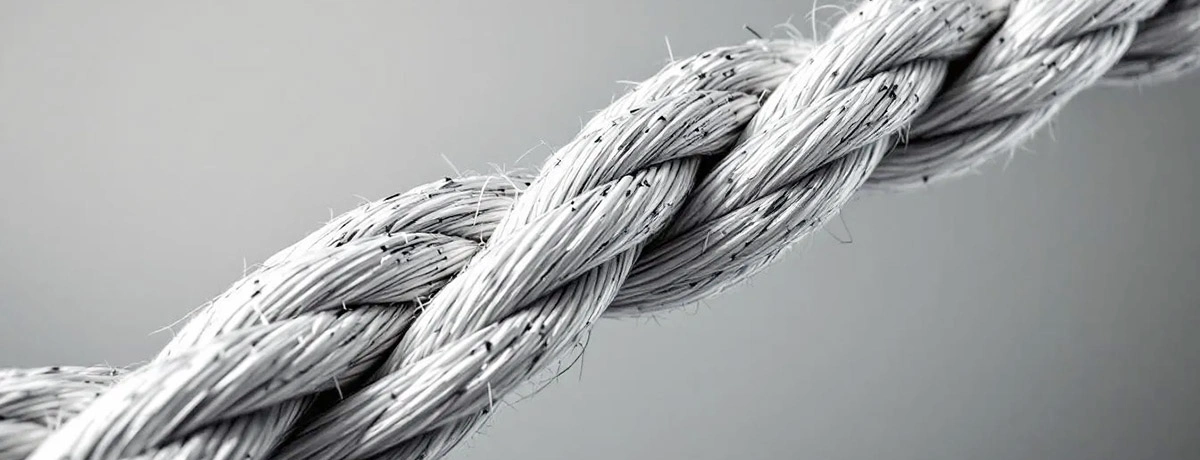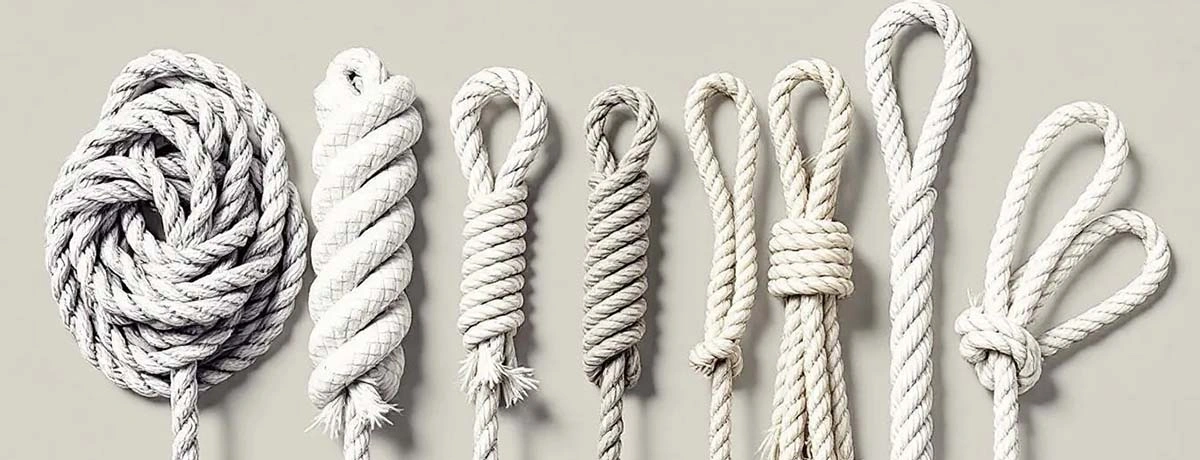What Is Polypropylene Rope and Why Is It So Popular for Outdoor Use?

Polypropylene rope is lightweight, strong, and floats. It’s used in marine, agriculture, and construction due to its resistance to chemicals and UV rays. This article covers its features, types, and applications.
Key Takeaways
-
Polypropylene rope is lightweight, durable, and resistant to rot, UV rays, and chemicals, making it suitable for marine, industrial, agricultural, and household applications.
-
The rope is available in twisted and braided types, with each design offering specific benefits such as ease of handling, flexibility, and strength.
-
Customization options for color, length, and packaging ensure that polypropylene ropes can meet diverse user requirements across various industries.
Understanding Polypropylene Rope

Polypropylene rope is a lightweight, durable, and cost-effective cord made from 100% polypropylene fibers. Its unique properties make it a popular choice across various industries, from marine and boating to agriculture and construction. Compared to nylon rope, polypropylene offers greater buoyancy and is more resistant to moisture, while nylon is known for superior durability, flexibility, and resistance to abrasion and environmental factors.
The rope’s strength, weather resistance, and buoyancy are just a few of the attributes that contribute to its widespread use.
Understanding the material composition and key features of polypropylene rope review highlights its versatility and why it stands out in terms of performance and reliability.
Key features of polypropylene rope make it an excellent choice for numerous applications.
Key Features
Polypropylene rope is notably lightweight and floats on water, ideal for marine and boating applications. Its 100% polypropylene composition ensures low density and buoyancy, advantageous for many water-related activities.
Polypropylene rope is also renowned for its resistance to UV rays, rot, and chemicals, ensuring longevity even in harsh environments. The smooth surface of the rope prevents splintering, enhancing safety and ease of handling during use. These features, combined with its durability and flexibility, make polypropylene rope a versatile and reliable choice for a wide range of applications.
Material Composition
Polypropylene rope is composed of 100% polypropylene fiber, which gives it its remarkable strength and durability. This material is known for its excellent resistance to various chemicals, making it a reliable choice for industrial applications where exposure to harsh substances is common. The construction of polypropylene rope ensures that it maintains a high strength-to-weight ratio, providing robust performance without being overly heavy.
MH polypropylene rope, in particular, is made from either virgin or recycled polypropylene, ensuring a sustainable option for environmentally conscious users. This material composition not only enhances the rope’s strength and chemical resistance but also contributes to its overall versatility and reliability in various applications.
Types of Polypropylene Rope

Polypropylene ropes come in various structures, each designed to meet specific application needs. The two primary types are:
-
Twisted ropes
-
Braided ropes Both offer unique benefits and characteristics. MH polypropylene rope is available in:
-
3-strand
-
4-strand
-
Braided structures providing further flexibility. These customization options allow users to select the most suitable rope for their particular requirements. Polypropylene rope is available in popular sizes such as 1/4" and 3/8' polypropylene rope, making it versatile and suitable for a wide range of applications.
Understanding the differences between twisted and braided polypropylene ropes aids in making informed decisions based on specific needs. Here’s a detailed look at each type to see their suitability for various uses.
Twisted Polypropylene Rope
Twisted polypropylene rope is constructed by twisting together multiple strands, typically in a three-strand configuration. This construction enhances the rope’s grip and makes it easier to splice, which is particularly beneficial for various fastening tasks. The ease of splicing twisted rope makes it a convenient choice for applications that require frequent adjustments and secure knotting.
The fibers used in twisted polypropylene rope are derived from a thermoplastic polymer, contributing to its strength and durability. This type of rope is commonly packaged on spools, making it easy to handle and store. Its robust construction and practical advantages make twisted polypropylene rope a reliable option for many applications, from marine to industrial use.
Braided Polypropylene Rope
Braided polypropylene rope is constructed from multiple strands woven together, providing:
-
Superior strength and flexibility
-
Less tendency to tangle
-
A smoother surface, making it easier to handle and more efficient in use
-
A smooth exterior that minimizes friction, making it ideal for use with pulleys and other hardware, including braided rope, making it stronger.
In addition to its structural benefits, braided polypropylene rope exhibits resistance to various chemicals, including oils and solvents. This chemical resistance enhances its usability in diverse environments, from marine to industrial applications. The combination of strength, flexibility, and chemical resistance makes braided polypropylene rope a versatile and reliable choice for many users.
Applications of Polypropylene Rope
Polypropylene rope’s versatility and cost-effectiveness make it suitable for a wide range of applications across different industries. Its lightweight, durable, and economical nature ensures that it meets the demands of various uses, from marine and boating to construction and DIY projects. The rope comes in several forms, including twisted, braided, solid braid, and hollow braid, each tailored for specific applications.
Some primary applications of polypropylene rope include marine and boating, agriculture and fishing, construction and industrial use, and DIY and household projects, each with its unique benefits. Polypropylene rope is also commonly used for marking boundaries in areas such as swim zones, pool lanes, or golf cart paths, providing clear visual delineation.
Marine and Boating
Polypropylene rope is a favorite in marine applications due to its lightweight nature and ability to float on water. This buoyancy makes it ideal for towing small boats and dinghies, as well as for docking and mooring applications. The rope’s resistance to rot and mildew ensures longevity even in the harsh, wet conditions of marine environments.
Polypropylene rope’s visibility in different colors enhances safety in low-light and water scenarios. Its flexibility and good grip make it suitable for tasks like creating safety lines and mooring ropes, proving indispensable for marine and boating enthusiasts.
Agriculture and Fishing
In agriculture and fishing, polypropylene rope is valued for:
-
Durability and flexibility
-
Common use in making nets and lines
-
Withstanding harsh conditions while maintaining flexibility
-
Strength and resilience to handle dynamic fishing environments without compromising performance
Polypropylene rope’s resistance to moisture and chemicals further enhances its suitability for agricultural and fishing applications. Whether used in crafting durable fishing nets or securing agricultural equipment, this versatile rope proves to be a reliable resistant knot choice.
Construction and Industrial Use
Polypropylene rope is widely utilized in construction and industrial settings due to its lightweight, durability, and resistance to moisture. Its strength and resistance to abrasion make it suitable for heavy-duty applications, such as safety barriers and lifting equipment. The rope maintains high breaking strength across various diameters, ensuring reliability in demanding environments.
In construction sites, polypropylene rope is frequently employed for securing materials and creating safety lines. Its robustness and economical nature make it an ideal choice for lifting and securing heavy materials, ensuring long-lasting performance even under challenging conditions.
DIY and Household
Polypropylene rope’s versatility extends to DIY and household tasks. In crafts, it creates functional and decorative items such as:
-
Plant hangers
-
Wall art Its lightweight, strong nature makes it effective for:
-
Tying
-
Bundling
-
Organizing household items.
For outdoor tasks, polypropylene rope is ideal for securing furniture and as washing lines due to its weather resistance. Whether in the garden or the kitchen, it proves to be a versatile and reliable tool for household projects.
Customization and Packaging Options
Customization options for polypropylene ropes allow for various specifications regarding color, length, and diameter tailored to client needs. These options provide flexibility for clients, ensuring that they can obtain ropes precisely suited for their intended applications. The ability to customize enhances product differentiation and meets specific customer requirements.
Polypropylene ropes are available in diverse packaging formats, including coils, reels, and shrink-wrapped bundles. These options cater to different distribution and usage requirements, ensuring clients receive their ropes in the most suitable format.
Color and Length Customization
OEM and ODM services enable businesses to select specific colors and lengths, enhancing product differentiation. Manufacturers offer customization options for rope length and diameter, ensuring that products fit the desired specifications. For example, MH polypropylene rope is available in diameters ranging from 2mm to 30mm, and lengths from 50m to 500m rolls, or per customer request.
The availability of solid, mixed, or custom colors further enhances the ability to tailor polypropylene ropes to specific needs. These customization options ensure that clients can obtain ropes that not only perform well but also meet their aesthetic and functional requirements.
Packaging Choices
Polypropylene ropes can be packaged in various formats, including:
-
coils
-
reels
-
hanks
-
spool
-
shrink-wrapped bundles
These packaging options provide flexible flexibility in meeting a range of distribution and usage requirements over time, ensuring that clients receive their great ropes in the most suitable format for their needs with a touch.
MH polypropylene rope can be packaged in coils, reels, or shrink-wrapped bundles, catering to different preferences and logistical needs. This variety ensures clients can choose the most convenient and practical option for their specific applications.
Advantages of Choosing MH Polypropylene Rope
MH polypropylene ropes combine durability, versatility, and affordability, making them ideal for industrial, marine, and general-purpose use. With over 25 years of experience in the textile and accessory industry, MH ensures consistent quality control and competitive pricing for global wholesalers. MH offers some of the most competitive prices in the market, making their polypropylene rope an economical choice for cost-conscious buyers. The company offers factory-direct bulk supply, providing reliable quality and steady availability for B2B customers worldwide.
MH’s extensive range of polypropylene ropes, combined with customization and packaging options, ensures that clients can find the perfect solution for their needs. Whether for marine, construction, or DIY applications, MH polypropylene ropes deliver exceptional performance and value.
Summary
In summary, polypropylene rope stands out for its remarkable durability, buoyancy, and resistance to rot, making it a versatile choice for various applications. From marine and boating to construction and DIY projects, its lightweight and cost-effective nature ensure that it meets the demands of different industries. The ability to customize color, length, and packaging further enhances its appeal, providing tailored solutions for specific needs.
Choosing MH polypropylene rope offers numerous advantages, including consistent quality, competitive pricing, and a wide range of options. With over 25 years of experience, MH is a reliable partner for all your polypropylene rope needs. Consider polypropylene rope for your next project and experience the benefits of this exceptional material.
Frequently Asked Questions
What makes polypropylene rope ideal for marine applications?
Polypropylene rope is ideal for marine applications due to its lightweight nature, buoyancy, and resistance to rot and mildew, making it suitable for towing, mooring, and safety lines. These qualities ensure durability and functionality in marine environments.
Can polypropylene rope be customized to specific needs?
Yes, polypropylene rope can be customized to specific needs regarding color, length, and diameter, with OEM and ODM services offering tailored solutions.
What are the primary types of polypropylene rope?
The primary types of polypropylene rope are twisted and braided. Twisted rope allows for easier splicing and offers a good grip, whereas braided rope excels in strength, flexibility, and resistance to tangling.
What are some common applications of polypropylene rope in construction?
Polypropylene rope is commonly utilized in construction for safety barriers, lifting equipment, and securing materials, thanks to its strength, durability, and resistance to moisture and abrasion. Its versatility makes it an essential tool in the industry.
Why should I choose MH polypropylene rope?
Choosing MH polypropylene rope ensures you benefit from its durability, versatility, and affordability, backed by over 25 years of expertise in providing high-quality, customizable options for diverse applications.


